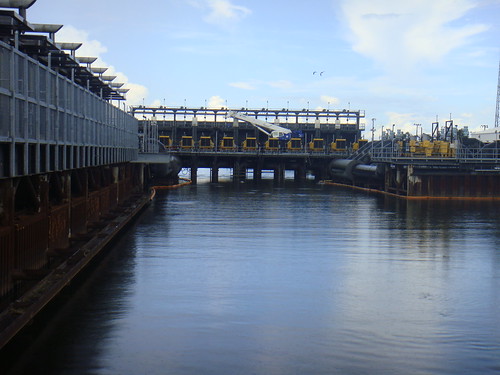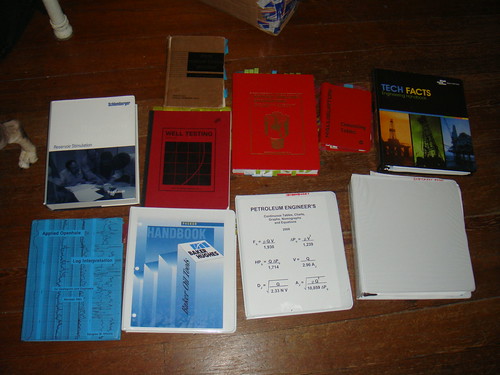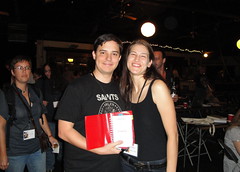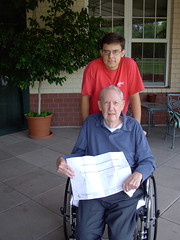
In the five years since the worst failure in the history American Civil Engineering, we've had to keep up with the Corps. They've done some good things since the storm (MR-GO closure, quick and strong repairs) and some not so good things (Option 1 vs. 2a/b debate for permanent pump stations). I'd like to go through 5 major ideas that, depending on how they settle, will determine what sort of levee system we end up with.
1- Design/Build. Shortly after the storm, the Corps decided to issue most of their contracts as Design/Build instead of the Design/Bid/Build, which they've used for decades. Nobody is really sure why the Corps is doing this. I've heard arguments from the Corps saying that they'll get more "creative" designs. I've heard arguments elsewhere saying that the Corps wants someone to throw under the bus in case there is another failure. The Corps also didn't initially free up any money for bid prep work, which meant that bidding firms would spend as little as possible preparing for the bids and would go with very conservative designs they knew how to estimate the cost of. Design/Bid/Build allows you to work the kinks out of the design while still on the drawing board. It's a hell of a lot cheaper to pay a few engineers overtime than have hundreds of workers and field equipment idle while you have to redesign something in the field once construction has begun. In general, I think the design/build approach will lead to excessive cost overruns, but won't make a difference one way or the other on the quality of the work.
2- Resiliency/Backup. One of the points the SELFPA-E has repeatedly made to the Corps when arguing for work on the interior canal walls is what happens if there's a failure of the interim control structure. I have no reason to think there is a design flaw, but if there was, then the flood waters would have a direct path into the city where we know that certain sections of the floodwalls are sub-standard. If the walls are repaired, there would be a second line of defense. The Corps has said that there's no money to do repairs to the existing walls and they can only do what Congress orders them to. The Corps wants to focus all their efforts on Option 1. Now, I will give the Corps credit because there have been several promises made to do at least a modest amount of work upgrading the canal walls at known weak points and that has at least partially mollified SELFPA-E's worries about the canal walls. There is some recognition within the Corps that redundancy is a good thing. OTOH, the Corps can shift some money around and it sort of pokes a hole in their "we do what Congress orders us to do" argument, because otherwise, they wouldn't spend a nickel on canal wall upgrades. From what I understand, it looks like there will be minimally acceptable repairs to canal walls, but many engineering experts, particularly the SELFPA-E would prefer to see more.
3- Geotechnical Analysis. Southeast Louisiana is built on very soft soils and the geotechnical analysis of what sort of loads it can carry is key to any large building project. Most of the geotechnical engineers I know do not believe the Corps' geotech methods are the best that are out there. Furthermore, while I can't say this about the Corps, I have personally seen geotechs put under enormous strain give a "better" answer to allow projects to move forward. The last thing I'll say about geotechnical engineering is it's one of those things in engineering that's still sort of art mixed with science. MIT did a famous study that was presented to ASCE where they constructed a dike, gave a group of eminent geotechnical engineers every single detail about how it was constructed (fill material, depth, volume, etc.) and asked the geotechnical engineers to provide an estimate of how high the water level inside the dike could go before the dike gave way. Of the 7 experts, 5 gave predictions significantly below the level that it failed at, 2 gave level substantially above the level it failed. The geotechnical engineers were given perfect data and no political or economic considerations factored into this test.*
4- B.31.3 Calculations. Matt McBride covered this a few years ago:
Post 1 and
Post 2. Later, Parsons wrote a
report [pdf] that stated the piping is properly designed, per ASME B.31.3 code. It doesn't happen often, but I can say absolutely, definitely, objectively that they are WRONG! I've done those ASME calcs many times before and they are just plain wrong. The consequences aren't all that severe (the piping would probably leak, causing a drop in pressure and lower pumping rates; very small risk of rupture/HSE danger), but it still worries me. If there's a mistake that obvious in something built to tight tolerances, what about more subjective engineering decisions that use materials with wide tolerances?
5- 100 vs. 1000 year protection. As
Tim has repeatedly pointed out, "100 Year" protection isn't enough. We need 500 or 1,000 year protection. Furthermore, I have personal questions about how those 100-year levels are computed. The Corps, in the post-Katrina work, has actually built a bit higher than strictly to 100-year protection. For example, some levees have a few extra feet to take subsidence into account and ensure that in a decade or so, the levees will still be well above the 100-year level. Outside the government, I've seen other organizations that have completely revamped what they consider to be a "100 year event". For example, offshore, what used to be considered a 1000-year design is now only considered a 100-year design and as a result, modern construction methods are much, much more robust than they were even just 5 years ago. Don't take my word for it. "Lessons Learned the Hard Way"
Page 11 [pdf]: "Yesterday’s 1000-yr criteria have become today’s 100-yr". You can also compare the old API RP's with
API 2INT-MET (subsequently integrated into current API RP's).
From all this, I hope everyone sees how important it is to keep an eye on the Corps. Oversight is incredibly important. Note that the SELFPA-E is spending an enormous chunk of their incredibly meager budget to get engineering firms to review the Corps design drawings and calculations. This is important work that must continue.
UPDATE- Minor edits for spelling.
___________________
* Paper: "Reliability of embankment performance predictions" Hynes and Vanmarcke, 1976.






